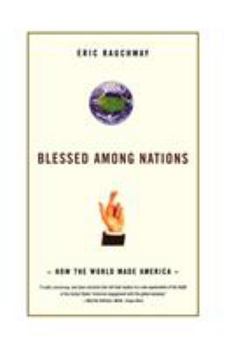Blessed Among Nations: How the World Made America
Select Format
Select Condition 
Book Overview
Nineteenth-century globalization made America exceptional. On the back of European money and immigration, America became an empire with considerable skill at conquest but little experience administering other people's, or its own, affairs, which it preferred to leave to the energies of private enterprise. The nation's resulting state institutions and traditions left America immune to the trends of national development and ever after unable to persuade other peoples to follow its example. In this concise, argumentative book, Eric Rauchway traces how, from the mid-1800s to the early 1900s, the world allowed the United States to become unique and the consequent dangers we face to this very day.
Format:Paperback
Language:English
ISBN:0809030470
ISBN13:9780809030477
Release Date:June 2007
Publisher:Farrar, Strauss & Giroux-3pl
Length:256 Pages
Weight:0.80 lbs.
Dimensions:0.8" x 5.4" x 8.4"
Customer Reviews
3 ratings
A fresh outlook
Published by Thriftbooks.com User , 15 years ago
I'm a big fan of Eric Rauchway's Edge of the American West blog, this book fits in with the blog's theme of fresh takes on 'old' questions. Definitely worth a read.
Good Analysis
Published by Thriftbooks.com User , 16 years ago
While devoted to the second half of the 19th century and early 20th century, this book has a strong contemporary flavor. Its themes are the effects of 19th century globalization, the concept of American exceptionalism, and why the USA was so poorly prepared to exercise world leadership after WWI. Rauchway's essential point is that much of what is thought of as American exceptionalism is the result of the unique ways in which 19th century globalization affected American society. American exceptionlism in this case means emphasis on a modest role for government, free market fundamentalism, avoidance of government responsibility for social welfare, and foreign policy based on unilaterialism. Geography and historical circumstances placed the USA in a privileged position. Separated by the Atlantic from the complex European state system, and with its international commerce protected by British hegemony, the USA was able to expand across North America with little threat from other major powers. During that expansion, the USA faced the resistance only of aboriginal peoples of largely neolithic technology. The USA never had to develop the military and state apparatus seen in powerful European states. Similarly, American expansion was fueled by European, largely British, capital flowing through private channels with the state playing only a minor role in fueling development. Rapid American development was also made possible by an influx of inexpensive labor from diverse immigrants. Rauchway argues that the multi-ethnic nature of the immigration prevented the emergence of a strong American socialist movement with the corollary that no American government felt it necessary to develop social welfare policies to buy social peace. At the time of entry into WWI, the USA had a modest government by European standards and the prior American experience has equipped the elites and general public of the USA poorly to exercise the needed world leadership. The conclusion of American exceptionalism as a contingent result of specific historical circumstances rather than vague appeals to some American traditions is convincing. Rauchway's arguments are interesting and supported well by the evidence he presents. He may underplay a bit some other important features, such as the relative importance of states in our Federal system. I think also that the lack of an American aristocracy changed the dynamics of American middle classe response to industrialization with Progressive era politics that inhibited the emergence of distinct socialist-working class political movements. Rauchway concludes with a brief and ironic section comparing our present situation and this earlier era of American life. Both are periods of globalization with considerable impact on American life. Both involve American hegemony. In the earlier period, however, globalization shaped America and brought about an America unprepared for world leadership. In our time, globalization is
excellent and very readable description of America's economic dependence on other nations
Published by Thriftbooks.com User , 16 years ago
I'm very surprised to find that this excellent book hasn't yet been reviewed. Rauchway writes in a very direct and readable style, presenting a wide array of data without numbing the reader's mind. He takes one through the development of the sense of "American exceptionalism" by showing how, all along, the US has been utterly dependent on foreign capital and the steady influx of foreign labor to develop the abundant resources lying at hand across the continent. A very helpful contribution to debates about immigration, global economics, and America's role on the world stage.






